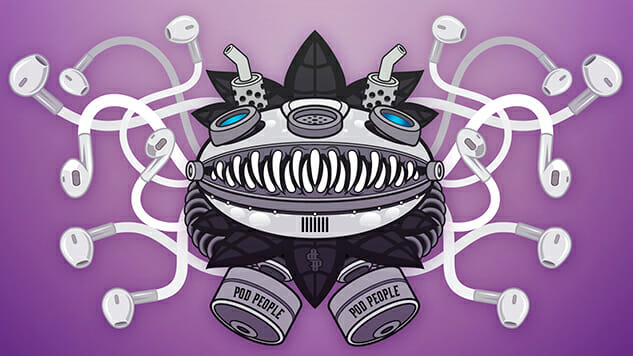The Removal of the Gatekeepers Has Lead to More Creativity, Character and Charm in Podcasting
Photo by Freehand Profit Media Features Podcasts
There’s a certain amount of fame and glamour that comes from hosting a show on Gimlet or NPR, however nerdy and Internet-centric this fact is. A huge audience means the same thing it always has; your voice will be heard.
Terrestrial radio has been sending its content into the podcast space for years because it’s simple and effective, but it has always existed alongside all kinds of shows that sound like nothing we’ve heard before.
The inquisitive voices you hear on public radio and their protégé counterparts are the result of decades of mentor/mentee relationships built around duplicating a system that works. Typically you need to adhere to the rules in order to find these audiences.
Today, that may be changing.
The 20-teen podcasters grew up in the time where they could create whatever they were able to conceive of on their laptop or their phone, resulting in games of D&D over Skype, narrative erotica from a family member, or an interview show where the guest is a past love interest. Now they’re taking these creations and showing them off to the world.
When I spoke with Pedro Alcocer, co-host of comedy interview show Expert Junior, he said “what the internet allows for, has always allowed for, is the gatekeepers to be irrelevant.” Podcasting allows for more creativity, better measurement, and larger and more accessible audiences than live events. But more than anything, “there’s nobody telling me I can’t do that.”
Time and again we’ve seen it with blogging and social media. Someone new to the scene shows up and absolutely blows us out of the water with their creativity, character and charm. Now that the barriers to entry have been lowered, we’re hearing quirky and weird voices spring through the cracks with new podcasts.
There will always be a space for talk radio, top 40 channels and narrative audio like This American Life, and these are the shows that paved the way to today, but most of my favorite podcasters don’t look or sound like traditional radio hosts. Often that’s what makes a show worth listening to. I’m speaking of cultural demographics (non-white male hosts) but I’m also speaking of the attitudes and charm of people hosting these shows.
In a recent episode of Sam Fragoso’s incredibly frank and candid interview show Talk Easy, Sam discussed the evolution of the podcasting medium with Why Oh Why host Andrea Silenzi, who spent a decade working as a producer at WNYC, KCUR and Slate before going all in with Why Oh Why, a Panoply pod.
Why Oh Why is Andrea’s first run at speaking into the mic, but she has years of practice discovering what works and what doesn’t at terrestrial radio stations. At one point in the interview, Sam asked her if she was taking a backseat to some of her previous hosts when she was producing, and she responds that this was intentional. “I’m grateful that I didn’t have a podcast when I was 22 because I don’t think I would have been able to do a good job of it, so lucky for you you’re doing a podcast at 22 and you’re doing great with it.”
Andrea is acknowledging that Sam is a newcomer and he’s lucky to have found success with his show. The context is that most people new to podcasting do not find that same success. She goes on to say “you’re getting to chat with some of the most interesting artists and musicians, and how great that you’re getting to just do your own thing and learning how to do your own thing better, but at the same time I’m grateful that the archives of my online presence 22 and younger are just basically stripped from the Internet. So I had that privacy to make those mistakes and be a dummy in the ways I was a dummy then.”
As an interesting side note, even though incredibly well-produced and equipped with her ten years of experience, Why Oh Why seems to be just as honest and direct as Talk Easy, which may be a sign that the system itself is changing.
The common thread is that these podcasts with very different production backgrounds have the same kind of appeal than something other than terrestrial radio. They have managed to maintain styles that wouldn’t necessarily work for old school radio. (It’s worth noting that Why Oh Why is a reboot of a show developed at WFMU.)
On this same note, it’s almost old hat to hear hosts discussing their struggles outside of their trade, an act of freedom that wouldn’t necessarily fit into the format of a traditional radio show. Marc Maron & Chris Hardwick often talk about their own sobriety on their respective shows, and a recent article from The Atlantic claims the hosts of My Favorite Murder speak openly about their struggles with anxiety, depression, alcoholism, and drug use.
We’re still always going to see new and amateur voices surviving and thriving, as well as older and more mature voices trying to break out of the sometimes established routines of terrestrial radio.
I’d love to head back to the dawn of radio and television to see if the same gawking entrance to the platform met those original forebears of entertainment.